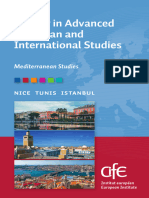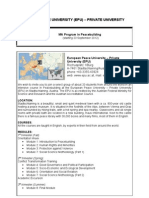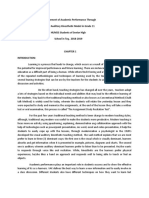0 ratings0% found this document useful (0 votes)
72 viewsEast Asian Economy and Society (Ecos) : Master of Arts (Ma)
East Asian Economy and Society (Ecos) : Master of Arts (Ma)
Uploaded by
ElbekriThe Master of Arts in East Asian Economy and Society (EcoS) is a 4-semester program offered by the University of Vienna's Department of East Asian Studies. The program consists of core courses in East Asian economics, politics, and society, as well as language training and a research thesis. It aims to provide regional expertise on East Asia through social science methodology and understanding of historical and cultural contexts. Graduates pursue careers requiring knowledge of East Asian economies, politics, business, or other fields.
Copyright:
© All Rights Reserved
Available Formats
Download as PDF, TXT or read online from Scribd
East Asian Economy and Society (Ecos) : Master of Arts (Ma)
East Asian Economy and Society (Ecos) : Master of Arts (Ma)
Uploaded by
Elbekri0 ratings0% found this document useful (0 votes)
72 views4 pagesThe Master of Arts in East Asian Economy and Society (EcoS) is a 4-semester program offered by the University of Vienna's Department of East Asian Studies. The program consists of core courses in East Asian economics, politics, and society, as well as language training and a research thesis. It aims to provide regional expertise on East Asia through social science methodology and understanding of historical and cultural contexts. Graduates pursue careers requiring knowledge of East Asian economies, politics, business, or other fields.
Original Title
East_Asian_Economy_and_Society.pdf
Copyright
© © All Rights Reserved
Available Formats
PDF, TXT or read online from Scribd
Share this document
Did you find this document useful?
Is this content inappropriate?
The Master of Arts in East Asian Economy and Society (EcoS) is a 4-semester program offered by the University of Vienna's Department of East Asian Studies. The program consists of core courses in East Asian economics, politics, and society, as well as language training and a research thesis. It aims to provide regional expertise on East Asia through social science methodology and understanding of historical and cultural contexts. Graduates pursue careers requiring knowledge of East Asian economies, politics, business, or other fields.
Copyright:
© All Rights Reserved
Available Formats
Download as PDF, TXT or read online from Scribd
Download as pdf or txt
0 ratings0% found this document useful (0 votes)
72 views4 pagesEast Asian Economy and Society (Ecos) : Master of Arts (Ma)
East Asian Economy and Society (Ecos) : Master of Arts (Ma)
Uploaded by
ElbekriThe Master of Arts in East Asian Economy and Society (EcoS) is a 4-semester program offered by the University of Vienna's Department of East Asian Studies. The program consists of core courses in East Asian economics, politics, and society, as well as language training and a research thesis. It aims to provide regional expertise on East Asia through social science methodology and understanding of historical and cultural contexts. Graduates pursue careers requiring knowledge of East Asian economies, politics, business, or other fields.
Copyright:
© All Rights Reserved
Available Formats
Download as PDF, TXT or read online from Scribd
Download as pdf or txt
You are on page 1of 4
Department of East Asian Studies
East Asian Economy
and Society (EcoS)
Master of Arts (MA)
Course Programme
Key Data Structure
Academic degree • M1 (30 ECTS) East Asian Language
Master of Arts (M.A.) (Chinese, Japanese or Korean)
• M2 (15 ECTS) East Asian Economy
Duration of the programme (Economic Systems and Economic
4 semesters, 120 ECTS credits Development)
• M3 (15 ECTS) East Asian Politics
Language of instruction (Political Systems and International
All courses are taught in English. Relations)
• M4 (20 ECTS) East Asian Society
Programme code (e.g. History, Religion, Culture,
066 864 Governance, Regionalism)
• M5 (40 ECTS) Research Seminar,
Admission Requirements master‘s thesis, and Final Examination
The EcoS programme is designed for
students who already have an under- For all details on the programme structure,
graduate or graduate degree. We are open please see the full curriculum, available at
to students with very diverse disciplinary www.ecos.univie.ac.at.
backgrounds. We particularly welcome
applicants with a background in enginee-
ring, natural sciences and social sciences.
Graduates of empirically focused East
Asian Studies programmes and other fields
of study are also eligible. Our working
language is English; prior knowledge of an
East Asian language is not required.
Applications for the next academic year
are accepted between 1 March
and 30 April each year. For more details on
current admission requirements and the
application procedure please see
www.ecos.univie.ac.at.
Mission Statement Content
The basic philosophy of our programme The M.A. programme consist of four core
rests on three pillars: seminars which focus on economic and
political systems, international relations
1) We believe that it is difficult to achieve and the e conomic development in
a proper understanding of regional and East Asia, as well as a changing variety
country-specific issues without a solid of elective courses on history, culture,
foundation in established theories and religion, governance and regionalism in
methods of social science. Acquiring East Asia. In addition, students receive
and utilizing such a methodology is basic l anguage training in Chinese,
therefore a core characteristic of this Japanese or Korean. Students are strongly
programme. encouraged to improve their language
2) However, even the best methodological skills by spending a s emester abroad in
skills are unlikely to produce optimal the region.
results if they are applied out of context.
Historical and cultural traditions,
customs, and values limit the number of Occupational Field
available options and influence choices
in East Asian societies as anywhere The M.A. programme is designed for
else. Knowing and understanding these individuals aiming for a professional career
specific factors is crucial and actively in fields like economics, politics, business
advocated in close cooperation with the administration, law, engineering, etc. who
other disciplines at the Department of want to gain regional expertise on East
East Asian Studies. Asia. The undergraduate degree usually
3) East Asia is more than just the sum of provides the basis for our students’ future
the countries in that region. Rather than occupational field. The distinctive regional
offering “light-versions” of Chinese, expertise demonstrated by holding an M.A.
Japanese or Korean studies, we focus in East Asian Economy and Society (EcoS)
on transnational and regional issues as enables our graduates to distinguish
well as on comparative approaches. themselves from their peers who have
pursued the same undergraduate studies.
Basic Information
The University of Vienna Student Point:
With 175 degree programmes, Information and Service
40 university continuing education and Do you have questions regarding the
training p rogrammes and about degree programmes offered by the
94,000 students, the University of Vienna is University of Vienna, the admission
the largest and most diverse educational procedure, the tuition fee, etc.?
institution in Austria. As the oldest
university in the German-speaking world, www.studentpoint.at provides answers
it offers more than 650 years of academic to all your questions in German and
experience. English in a non-bureaucratic and fast way.
In addition, Student Point advises current
The City of Vienna and prospective students in German or
Situated at the heart of Europe, Vienna English on all issues pertaining to studying
successfully combines imperial tradition at the University of Vienna – per e-mail
and contemporary style. The city and via phone:
repeatedly ranks on top of the most
liveable cities worldwide, offering a rich www.studentpoint.at
cultural scene, diverse leisure activities Phone: +43 1 4277 10600
and a vibrant student life. English: english.studentpoint@univie.ac.at
German: studentpoint@univie.ac.at
Contact
www.ecos.univie.ac.at
East Asian Economy and Society
ECOS Uni Wien
ecos@univie.ac.at
East Asian Economy and Society (EcoS)
Department of East Asian Studies
Spitalgasse 2, Hof 2, Entrance 2.3
A-1090 Vienna
You might also like
- Nursing Test Reviewer PDFDocument399 pagesNursing Test Reviewer PDFAnnoy Ladjamatli92% (24)
- Sample Narrative Essay PDFDocument2 pagesSample Narrative Essay PDFMalik Bilal Hussain95% (21)
- Kaiwa L-51 PDFDocument13 pagesKaiwa L-51 PDFAcea Medina100% (5)
- ILTS Score ReportsDocument6 pagesILTS Score Reportsperrynb8399No ratings yet
- Soas CulturalDocument10 pagesSoas Culturalmoebius70No ratings yet
- Hum MA Black SeaDocument2 pagesHum MA Black SeaArif BudimanNo ratings yet
- History: Central European UniversityDocument4 pagesHistory: Central European UniversityGloria DiaoNo ratings yet
- Daad Courses 2020 11 26Document45 pagesDaad Courses 2020 11 26S M Asif Ur RahmanNo ratings yet
- Tourism & Hospitality Program (THP)Document5 pagesTourism & Hospitality Program (THP)Samuel NovianoNo ratings yet
- Master's Scholarships To The Yenching Academy Peking University, Beijing, ChinaDocument2 pagesMaster's Scholarships To The Yenching Academy Peking University, Beijing, ChinaJL SchlebuschNo ratings yet
- Aristotle University of Thessaloniki School of Architecture: Profile DescriptionDocument2 pagesAristotle University of Thessaloniki School of Architecture: Profile DescriptionShyam VarmaNo ratings yet
- Black Sea Cultural Studies: MA inDocument2 pagesBlack Sea Cultural Studies: MA inAnca PopNo ratings yet
- About The Department: Bachelor'S DegreeDocument2 pagesAbout The Department: Bachelor'S DegreedakicaNo ratings yet
- IE Master in International Relations BrochureDocument28 pagesIE Master in International Relations BrochureHanan AhmedNo ratings yet
- Description: Tags: Uisflabstracts2007Document32 pagesDescription: Tags: Uisflabstracts2007anon-933355No ratings yet
- European University Institute: Postgraduate Studies at TheDocument32 pagesEuropean University Institute: Postgraduate Studies at TheMahmoud Abo ZiedNo ratings yet
- Monash University Handbook 2011 Undergraduate - CourseDocument4 pagesMonash University Handbook 2011 Undergraduate - CourseJoeLowNo ratings yet
- Call CEU SUN 2023 PDFDocument8 pagesCall CEU SUN 2023 PDFvaheNo ratings yet
- Project Proposal - Increasing Asia Literacy Through Whole School ActionDocument9 pagesProject Proposal - Increasing Asia Literacy Through Whole School Actionapi-321048326No ratings yet
- WL M MAMES Major HS22Document15 pagesWL M MAMES Major HS22Fatih GökmenNo ratings yet
- Study Opportunities in Abroad, Zhalaldin DDocument13 pagesStudy Opportunities in Abroad, Zhalaldin DДильназ ЖалалдинNo ratings yet
- Guide 02 enDocument84 pagesGuide 02 enSyihabuddin Al-habsyiNo ratings yet
- 2016 - 2) Defining Higher Education Issues and Challenges in Southeast AsiaASEAN Within The International ContextDocument26 pages2016 - 2) Defining Higher Education Issues and Challenges in Southeast AsiaASEAN Within The International Contextravino69No ratings yet
- Master in Advanced European and International StudiesDocument8 pagesMaster in Advanced European and International StudiesAlexandra ErhanNo ratings yet
- CEU CulturalHeritagStudies FlyerDocument3 pagesCEU CulturalHeritagStudies FlyerIoana MunteanuNo ratings yet
- 2023 SPS1 2 InfoDocument9 pages2023 SPS1 2 InfosofiagoelNo ratings yet
- Strategic Plan 2015-2019Document18 pagesStrategic Plan 2015-2019api-433599213No ratings yet
- Master of Arts in Philosophy, Politics and Economics (MA PPE) WittenHerdecke University - WittenDocument8 pagesMaster of Arts in Philosophy, Politics and Economics (MA PPE) WittenHerdecke University - WittenHieu NguyenNo ratings yet
- Innovation Global Sustainable Development 2019 Fact Sheet 1Document2 pagesInnovation Global Sustainable Development 2019 Fact Sheet 1IngridNo ratings yet
- Course Proposal Summer SchoolDocument11 pagesCourse Proposal Summer SchoolMaryroseNo ratings yet
- Student ETH BrochureDocument98 pagesStudent ETH BrochureabedinzNo ratings yet
- 4823 19159 2 PBDocument45 pages4823 19159 2 PBHa MyNo ratings yet
- 2014 PG Guide PDFDocument76 pages2014 PG Guide PDFhamidNo ratings yet
- Studying in AustriaDocument104 pagesStudying in AustriaBanda E WaliNo ratings yet
- Eui Ph.d. Programme BrochureDocument20 pagesEui Ph.d. Programme Brochureseadeco1991No ratings yet
- Stella Maris College: (Autonomous), Chennai, IndiaDocument16 pagesStella Maris College: (Autonomous), Chennai, IndiaCasey JonesNo ratings yet
- Arts 2457Document8 pagesArts 2457findheroNo ratings yet
- Dear Prospective Student: ContactDocument2 pagesDear Prospective Student: ContactAlexandru Ionuţ PohonţuNo ratings yet
- TSU BrochureDocument12 pagesTSU Brochuredavit.gulbani767No ratings yet
- Post Colonial South Asia HandbookDocument46 pagesPost Colonial South Asia HandbookTestGLNo ratings yet
- College of Humanities, Arts, and Social SciencesDocument32 pagesCollege of Humanities, Arts, and Social SciencesGlenden KhewNo ratings yet
- Course Description:: Associate Prof. Dr. Philipp O. Amour Dr@philipp-Amour - CHDocument12 pagesCourse Description:: Associate Prof. Dr. Philipp O. Amour Dr@philipp-Amour - CHpolat yilmazNo ratings yet
- Untitlede 57Document7 pagesUntitlede 57Moosaa Bin-SuhaylNo ratings yet
- Discover Excel Lence!: West UniversityDocument24 pagesDiscover Excel Lence!: West UniversityAlexandra ErhanNo ratings yet
- Uow 094876Document434 pagesUow 094876efafasasfasfdfgdasdf sdfsfsdfdsfsdfsNo ratings yet
- MAINS-2013-Admission Guide (최종배포용) - 0913Document7 pagesMAINS-2013-Admission Guide (최종배포용) - 0913Pete RahonNo ratings yet
- Broschuere Banking and Finance A5 9 FinalDocument8 pagesBroschuere Banking and Finance A5 9 Finalmustafaji2000No ratings yet
- Syllabus SES3011 2021Document26 pagesSyllabus SES3011 2021David FungNo ratings yet
- Description: Tags: Uisfl-2002Document10 pagesDescription: Tags: Uisfl-2002anon-62086No ratings yet
- File 101803Document13 pagesFile 101803ootchayNo ratings yet
- MA in Peace Building Engl. Starting Fall 2012Document2 pagesMA in Peace Building Engl. Starting Fall 2012pjs216No ratings yet
- Revised Handbook For English LanguageDocument18 pagesRevised Handbook For English LanguagePa Alieu M. FyeNo ratings yet
- Flyer Masses Enbkjj5jDocument2 pagesFlyer Masses Enbkjj5jAlda BaraNo ratings yet
- POLI21012 Course Guide 2022-23Document13 pagesPOLI21012 Course Guide 2022-23TomNo ratings yet
- East-West Center: Asian Development Bank-Government of Japan Scholarship ProgramDocument13 pagesEast-West Center: Asian Development Bank-Government of Japan Scholarship Programsoemarsono47No ratings yet
- MA in Peace and Conflict Studies Engl. Starting Fall 2012Document2 pagesMA in Peace and Conflict Studies Engl. Starting Fall 2012pjs216No ratings yet
- Department of Music: National University of Ireland, Maynooth Ollscoil Na Héireann, Má NuadDocument5 pagesDepartment of Music: National University of Ireland, Maynooth Ollscoil Na Héireann, Má NuadDaniel VissiNo ratings yet
- Application FormDocument25 pagesApplication FormMaría Luisa Rivas EscorciaNo ratings yet
- Mercy Mathematic Broschure 2014 1Document6 pagesMercy Mathematic Broschure 2014 1api-233159476No ratings yet
- MAINS Admission Guide2011Document6 pagesMAINS Admission Guide2011Pete RahonNo ratings yet
- University of Cassino and Southern LazioDocument2 pagesUniversity of Cassino and Southern LazioShon AbrahamNo ratings yet
- Leventis Fellowship 2012-13 DetailsDocument3 pagesLeventis Fellowship 2012-13 DetailsAdriana MutuNo ratings yet
- Web Ba 2019Document32 pagesWeb Ba 2019Bomba HeroNo ratings yet
- Dialogue through Education- Learning between Europe and China: The first EU-China Essay CompetitionFrom EverandDialogue through Education- Learning between Europe and China: The first EU-China Essay CompetitionNo ratings yet
- College HandbookDocument16 pagesCollege HandbookJohann WieseNo ratings yet
- CITY STAR Newspaper February 2017 EditionDocument20 pagesCITY STAR Newspaper February 2017 Editioncity star newspaperNo ratings yet
- Special Education ChecklistDocument5 pagesSpecial Education Checklistapi-456965532No ratings yet
- Spelling and Writing ActivitiesDocument11 pagesSpelling and Writing ActivitiesElaine ChinNo ratings yet
- Repair of ArmchairsDocument5 pagesRepair of ArmchairsMelbourneSinisinNo ratings yet
- Commencement Speech: Graduate College, Oklahoma State University, December 12, 2014Document4 pagesCommencement Speech: Graduate College, Oklahoma State University, December 12, 2014indiamaheshNo ratings yet
- Montessori EducationDocument9 pagesMontessori EducationStefan LucaNo ratings yet
- Lesson Plan Tot 609Document4 pagesLesson Plan Tot 609Bayu PermanaNo ratings yet
- Taylor's Student Grading ChoiceDocument10 pagesTaylor's Student Grading ChoiceSharvind Kumar Sharvind KumarNo ratings yet
- Curicullum Vitae SampleDocument9 pagesCuricullum Vitae SampleEarl Rodriguez SampagaNo ratings yet
- Exercise and Sports: 16 Question StripsDocument2 pagesExercise and Sports: 16 Question StripsSadaf Mehmood Teaching Research AssociateNo ratings yet
- 2010 Annual Challenging GiftedDocument8 pages2010 Annual Challenging Giftedapi-413748610No ratings yet
- Mission CalendarDocument1 pageMission Calendarapi-366866473No ratings yet
- Whole Brain Cheat SheetDocument9 pagesWhole Brain Cheat Sheetlindsey_brouwersNo ratings yet
- 17-18 Vis Art SyllabusDocument2 pages17-18 Vis Art Syllabusapi-326946627No ratings yet
- Presentation On Concept MapsDocument17 pagesPresentation On Concept MapsMandy BuchananNo ratings yet
- Insights On Work ImmersionDocument1 pageInsights On Work ImmersionOrie Mae71% (14)
- 101T Book ClubDocument4 pages101T Book ClubNicole WilliamsNo ratings yet
- School InfoDocument113 pagesSchool InfopavanNo ratings yet
- Coop Training Guide - 103Document6 pagesCoop Training Guide - 103Mohammed AljohaniNo ratings yet
- Digital English Language Lab For SchoolsDocument26 pagesDigital English Language Lab For SchoolsDivya SinghNo ratings yet
- Relatives Who Which WhoseDocument3 pagesRelatives Who Which Whoseblu3eyes15No ratings yet
- Visual Auditory Kinesthetic Model in Grade 11 HUMSS Students of Senior High School in Tuy, 2018-2019Document3 pagesVisual Auditory Kinesthetic Model in Grade 11 HUMSS Students of Senior High School in Tuy, 2018-2019Jeffrey ChanNo ratings yet
- Prayer of A Student TeacherDocument78 pagesPrayer of A Student TeacherNhoj Notle TangpuzNo ratings yet
- Roles and Functions of Educational Media CenterDocument2 pagesRoles and Functions of Educational Media CenterRoselyn Mayongue BrazaNo ratings yet
- Issue 1 '09Document8 pagesIssue 1 '09thesurvey100% (1)

























































































